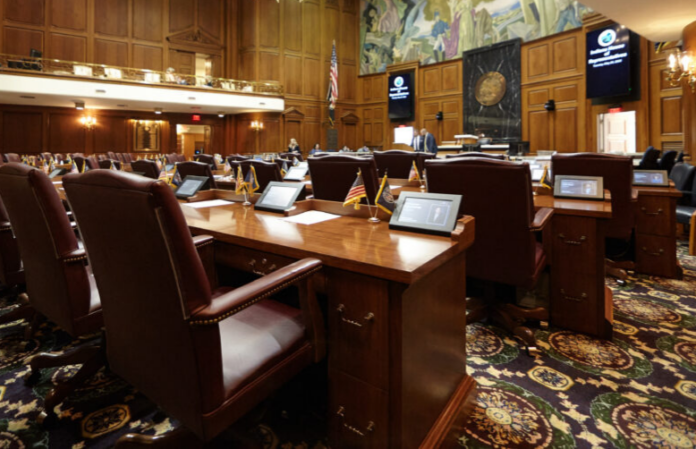By Leslie Bonilla Muñiz
Indiana Capital Chronicle
INDIANAPOLIS — Small, inexpensive tracking devices like Apple’s AirTag have become ubiquitous — and their misuse is on the rise, Indiana lawmakers say.
That’s why the Indiana House on Tuesday unanimously approved a measure criminalizing non-consensual tracking.
Lawmakers also moved bills on throwing stars, air pollution and more.
Senate Bill 161 was inspired by Millie Parke, whose ex-boyfriend stabbed her in the heart outside a gas station two years ago, after planting a tracker on Parke’s car without her knowledge.
“It took two sweeps for people to find the tracking device that he had been using,” the bill’s House sponsor Rep. Wendy McNamara, R-Evansville, said on the floor.
The bill adds putting a tracking device on someone or their property without consent to the definition of “unlawful surveillance,” a Class A misdemeanor that can rise to a Level 6 felony in specific circumstances. And stalking, which is usually a Level 6 felony, would be upped to a Level 5 if the act involved tracking.
The state and juries could also use proof of tracking to extend jail sentences. And courts could alter protection orders to block tracking.
There are limited exceptions for law enforcement, incarcerated and convicted people, family members, property, car manufacturers and electronic communications companies.
The House approved it 95-1. But it’s seen edits since leaving the Senate, so it must return to that chamber for a concurrence vote before heading to the governor’s desk.
Throwing stars not just for bars
A bill that originally would’ve allowed recreational use of throwing stars at some businesses — like throwing axe-style bars — now would legalize their use anywhere, except on school property.
Senate Bill 77 categorizes throwing stars as knives. That’s a major departure from current law, which says any possession of such a weapon is a Class C misdemeanor.
The bill passed 90-6 and now returns to the Senate. That chamber can accept the expansion of the bill or send it to a conference committee for further negotiations.
Lawmakers reluctantly hike air polluting fees
Indiana’s federally mandated air emissions program will escape U.S. Environmental Agency takeover — for now.
With emissions down, the state’s air program isn’t bringing in enough money to sustain itself, edging toward violation of the federal Clean Air Act.
Senate Bill 155 raises annual base fees to $6,100 per permit. It’s currently $2,381 per permit, according to IDEM. The original version would’ve let the state raise fees — whenever it needed, and by as much as it needed — but lawmakers said the proposal needed “guardrails.”
House sponsor Alan Morrison, R-Brazil, said he was initially a “hard no” on the bill. But he’s since changed his mind, emphasizing the bill allowed a “one-time” increase.
“This is something that actually the folks within the industry are okay with, because the last thing they want is the EPA coming in and administering this program,” Morrison said.
The bill passed 76-19 and now returns to the Senate.
Concurrence approvals
House lawmakers finished off a busy week by approving Senate-edited versions of their bills — some contentious.
They approved a priority bill on electricity policy and a proposal creating 25-foot bubbles around law enforcement officers. They also advanced a bill letting utility companies charge customers for plants before they ever go online, rather than finishing the work and building costs into rate requests afterward.
Those bills now go to Gov. Eric Holcomb.
The Indiana Capital Chronicle is an independent, nonprofit news organization dedicated to giving Hoosiers a comprehensive look inside state government, policy and elections. The site combines daily coverage with in-depth scrutiny, political awareness and insightful commentary.
You can read the original version of the story here.





